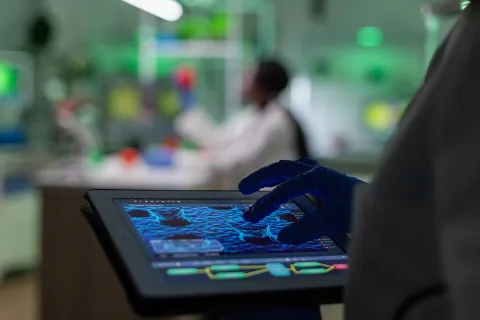
The pharmaceutical industry is undergoing a significant transformation, with Artificial Intelligence (AI) and Machine Learning (ML) at the forefront of this change. AI-driven validation services are now revolutionizing the way pharmaceutical companies approach quality assurance, ensuring that products meet the highest safety and efficacy standards. Let's delve into how these technologies are changing the landscape of pharmaceutical quality assurance.
Enhanced Data Integrity and Compliance
AI-driven systems offer unparalleled capabilities in managing and analyzing vast amounts of data with high accuracy and consistency. This is crucial for maintaining data integrity, a core component of Good Manufacturing Practice (GMP). AI algorithms can detect anomalies and patterns in data that would be impossible for humans to identify, leading to more reliable outcomes and adherence to regulatory standards.
Key Points:
- AI algorithms ensure high accuracy in data analysis.
- Anomaly detection leads to improved data integrity.
- Compliance with GMP is enhanced through AI-driven systems.
Streamlined Process Validation
Process validation is a critical step in pharmaceutical manufacturing, ensuring that each product batch meets predefined quality criteria. AI-driven validation services can automate and optimize this process, providing real-time insights and predictive analytics to foresee potential issues before they arise. This proactive approach not only saves time but also significantly reduces the risk of product recalls and non-compliance.
Key Points:
- Real-time insights and predictive analytics optimize process validation.
- Automation of validation processes saves time and resources.
- AI-driven services reduce the risk of product recalls.
Robust Analytical Method Validation
The validation of analytical methods is essential for ensuring the reliability of test results. AI-driven validation services can enhance the performance characteristics of content assignment validation, such as linearity range, sensitivity, and specificity. By automating the validation of analytical methods, pharmaceutical companies can achieve higher accuracy, precision, and speed in their quality control processes.
Key Points:
- AI enhances the validation of analytical methods.
- Automation leads to higher accuracy and precision in test results.
- Speed in quality control processes is significantly increased.
Improved Equipment and Facility Validation
AI-driven validation services extend their benefits to the validation of manufacturing equipment and facilities. By monitoring equipment performance and environmental conditions, AI systems can predict maintenance needs and optimize facility operations. This ensures that the manufacturing environment consistently meets the stringent requirements for drug production.
Key Points:
- AI systems monitor and optimize equipment performance.
- Predictive maintenance ensures uninterrupted production.
- Facility operations are optimized to meet drug production standards.
Advanced Stability Testing and Post-Marketing Surveillance
Stability testing is a vital part of pharmaceutical quality assurance, determining the shelf life and storage conditions of products. AI-driven services can manage stability studies more efficiently, analyzing complex data sets to predict product stability over time. Additionally, AI can enhance post-marketing surveillance, continuously monitoring product performance and safety in the market.
Key Points:
- AI manages stability studies with greater efficiency.
- Predictive analysis determines product shelf life accurately.
- Post-marketing surveillance is enhanced through continuous monitoring.
Collaboration and Regulatory Alignment
The integration of AI in pharmaceutical quality assurance requires close collaboration between industry stakeholders and Regulatory bodies. AI-driven validation services must align with existing regulations and guidelines, such as ICH Q7 for Good Manufacturing Practice and ICH Q9 for Quality Risk Management. Regulatory agencies are actively engaging with stakeholders to develop recommendations and guidelines for the use of AI in pharmaceutical manufacturing.
Key Points:
- Collaboration between industry and regulators is essential.
- AI-driven services must align with existing regulations.
- Regulatory agencies are developing AI-specific guidelines.
Conclusion
AI-driven validation services are revolutionizing the field of pharmaceutical quality assurance. By enhancing data integrity, streamlining validation processes, and improving analytical methods, AI is setting a new standard for the industry. As we continue to witness the integration of AI in pharmaceutical manufacturing, these technologies are not just the future-they are the present, driving innovation and ensuring the highest quality of healthcare products for consumers worldwide. Consult with our experts today for innovative solutions and stay ahead of your competitors.









